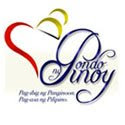Launching of Pondo ng Pinoy Community Foundation, Inc.
Folk Arts Theatre
(Editor’s Note: This article is a transcript of the talk of Bishop Chito Tagle during the launching of Pondo ng Pinoy. Due to some garbled parts of the recording towards the end of his talk, a faithful summary is herein encoded.)
The story of The Rich Man and Lazarus (Lk
The story is derived from the Gospel of St. Luke. With St. Luke being a beloved doctor, his gospel accounts tend to show the face of Jesus as a doctor. In The Rich Man and Lazarus, Jesus has pinpointed a sickness that affects all other spheres of our life, be it economic, political, cultural or familial. It is the illness of faith.
Three symptoms of a sick faith
This illness of faith shows in man’s relationship with the material world, with other human beings, and with God.
Man’s relationship with the material world is characterized by the first symptom: The Economics of Affluence. The Tagalog translation is more powerful and graphic: Ang Ekonomiya ng Pagkamkam. The Rich Man was dressed in the finest clothes and had plentiful food every single day of his life. Every single day, araw-araw, until it became his lifestyle, his second nature. Man is faced with this situation every single day of his life, from the smallest corners of the home to the highest corridors of power. What matters is not being more, but having more – more cars than one’s neighbor, more savings for a rainy day, more profit from business ventures, more votes regardless of the truth. Jesus saw this situation as a question of faith, for does God not know man’s every need and promised to provide? (Ref. Lk 12:22-31).
The second symptom of the illness of man’s faith stems from relationship among fellow human beings: The Politics of Marginalization; more forcefully, Ang Politika ng Pagkamanhid. The Rich Man did not mind Lazarus, covered with wounds and praying for mere crumbs that fall from his table. There was a great chasm between them, even,though Lazarus was just at the Rich Man’s door. Because the Rich Man was already comfortable, his world no longer accounted for Lazarus. Farther and farther, every single day, araw-araw, until every single day reached forever at death, and the chasm became permanently unbridgeable. Man responds to a similar situation every single day; a tap on the car window for every street children begging for coins; an absent nodding of the head for a lola on the umpteenth retelling of the story of her life; bribing for one’s convenience. In a sense, this politics of marginalization is necessary to the economics of affluence. Once man starts serving mammon, one can no longer be present to the people around him.
The third symptom boils down to man’s relationship with God: The Religion of Alienation; more descriptively: Ang Relihiyon ng Itinatagong Diyos. Experiencing great pain in hell at death, the Rich Man implored Abraham to take pity on him and his brothers. At the moment of suffering, the Rich Man called on God because he needed God. At the experience of pain and anguish, the Rich Man called on God even if he lived everyday as if God did not exist. This split consciousness pervades man’s everyday existence, as if the practice of one’s faith (if at all) belonged to a neat little box that therefore does not permeate the economic, political, familial realms of one’s life. Jesus said “you cannot serve two masters”. Man more often chooses to live outside where God is, and to remember Him only when needed.
The lesson is clear: Ang ginagawa at di ginagawa araw-araw ay malaki ang kinalaman sa ganap na buhay magpakailanman. What we do and do not do every single day has great bearing in attaining the fullness of man’s life for eternity. As the Rich Man hid from God while on earth, so was God hidden from him in eternal life. If only Lazarus were not removed from the Rich Man’s world, they would have been together in the bosom of Abraham.
(Note: Bishop Chito Tagle, in his talk on “The Theology of the Crumbs” shared: Kusang dulot, kusang lapit, karanasan na ng langit. Araw-araw na pagmamahalan, ligaya’y magpakailanman. He also stressed: Kaligtasa’y di pabuya sa mabuting gawa. Ang mabuting gawa ay patunay na kaligtasa’y nandito na.)
Curing the illness
This insight brings us to three choices in life every single day: The Economics of Affluence or The Economics of Trust in God? The Politics of Marginalization or The Politics of Love and Compassion? The Religion of Alienation or The Religion of the Living God? In the vernacular: Ang Ekonomiya ng Pagkamkam o Ang Ekonomiya ng Pagtiwala sa Diyos? Ang Politika ng Pagkamanhid o Ang Politika ng Pagmamalasakit? Ang Relihiyon ng Itinatagong Diyos o Ang Relihiyon ng Buhay na Diyos?
(Note: Bishop Tagle, in the same talk, advised Catholics to take one important step before making their choice: “Bago pumili, aminin natin na ang pananampalataya natin ay di parating malusog. Tapos nito, tsaka tayo bumalik sa Diyos, sa kapwa at sa mundo para Diyos ang mahalin.” Bishop Tagle ended his talk with a sharing that is useful to summarize here:
“Nasaan ang Diyos?” Faced with this question from two survivors of the Payatas landslide – a disheveled man and his baby hungrily sucking at a bottle of murky water – the good Bishop, steeped in years of theological and divinity studies, could give no immediate answer. Only after letting them in, giving them some food to eat and milk to drink did an answer dawn on him. “Nakita ko na. Dinalaw ako ng Diyos. At harinawa, sa ilang pagkain at ngiti, nakita rin nila ang Diyos.” )
Through Pondo ng Pinoy, through the living out of the Theology of the Crumbs, may we find grace to see God in the everyday choices of our life; in the small, seemingly insignificant acts we do. Sa araw-araw na ginawa ng Diyos.




No comments:
Post a Comment